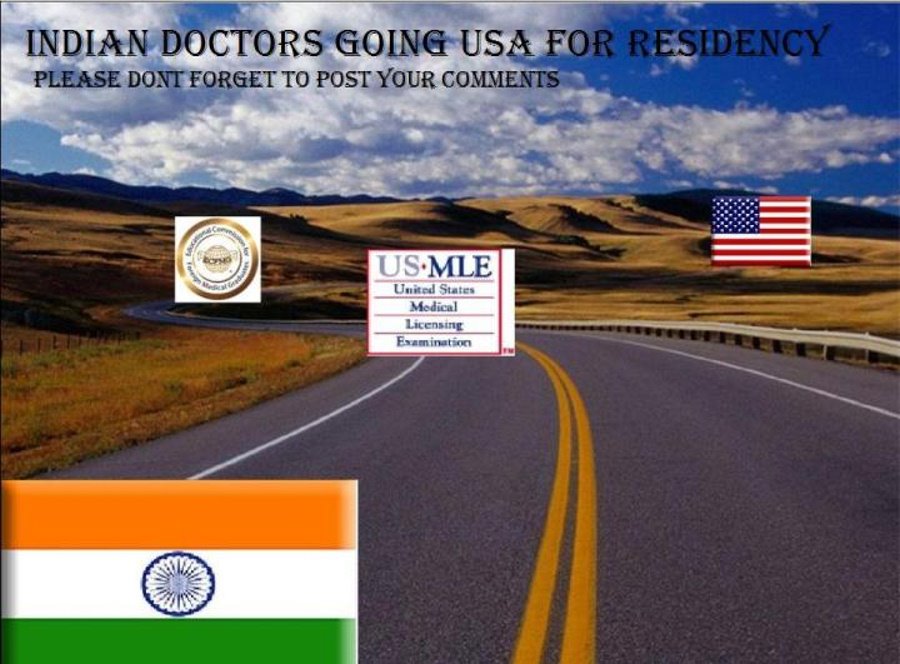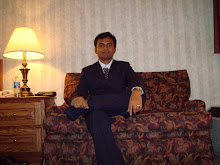Hi Guys,
I have seen lot of traffic on my blog searching for "Indian Doctors in US" of course which is the main theme for my Blog!
I started this blog just out of fancy keeping myself in mind who is obviously an Indian doctor.
I started my life searching here and there how to get into US medical system.Today I wanna post a blog what are our chances of getting into this system.
If you are a Medical student you can do electives here.In any branch you want and which is like doing our Internship/House surgency in India.but just doing only selective departmenmts which help in our chosen career.For e.g., if you want to pursue Internal Medicine...You can do any IM related i.e., Gastro or cardio "Elective" in any med school.These days getting electives are also getting tough.Some are paid and some are non-paid.Once you are done you will be having hands-on clinical experience which helps you in smooth transition into residency.But you wont get any degree here that you have done electives but,Some LORs(Letter Of Recommendations).
If you are a Physician ,have done Internship and got MBBS degree,you are not eligible to do electives in US.
OR
If you are a MD or MS Physician the fate is same but here comes the option of PRACTICE in US
Residency is what we call post graduate training in India or simply PG
In Order to practice in US u need to get state license which requires at least 2-3 yrs of "Accredited American Graduate medical education"(RESIDENCY) according to AMA(American Medical Education) found ...HERE
and if u r Board Certified it adds to authenticity and value ...!
Basically to practice in US one need NOT ! be BOARD CERTIFIED according to certiFACT"Board certification is a voluntary process and over 80% of the physicians in the U.S. are board certified; however, a physician is licensed by the state to “practice medicine and surgery” and board certification is not a requirement for licensure. A licensed physician may practice in whatever area of medical interest they have and can legally hold themselves out to be practicing in that field of interest without necessarily having obtained a residency or fellowship providing advanced training in that area. Board certification, however, means that the physician’s skill and knowledge in the specialty/subspecialty has been examined and tested and meets standardized requirements"
"Most International Medical Graduates need to complete some required training in this country before they are able to take a particular board’s exam if all the postgraduate training was completed in another country. Exceptions are made and vary with each board. (Some boards may accept Canadian and/or United Kingdom residencies. Call the Member Board for further information on this.)"
also
"If a doctor is "licensed to practice medicine" does that mean he/she is certified?
No. Obtaining a medical license and being certified as a medical specialist by an ABMS Member Board are two different and separate processes. A license, legally required in order to treat patients, is issued and required by the state or territory in which a doctor practices medicine. A specialty certificate is issued by a medical specialty certifying board, which is valid nationwide. Although certification is not required for an individual physician to practice medicine, most hospitals and managed care organizations require that at least a certain percentage of their staff be, " board certified." Today, approximately 89% of licensed physicians are certified by one or more ABMS Member Boards."
But I came to know that if you have done residency here,You can start practicing here as affiliated with a hospital called "HOSPITALIST" and you will be given 3yrs time to clear the board exam.
At the beginning of residency people apply for Initial Medical licnsure and its requirements vary by state and if you are an IMG
In order to get this initial licensure, you have to finish USMLE Step 3 and which in turn requires the clearance of step1,2(CK ,CS).
For clearing STEP3 the criteria vary by state.some require at least one year of residency training,where as some don't need any special requirements.
So in order to practice here,you need to finish all the USMLE steps includin Step3.
More info can be found here
This is what mentioned on FSMB(www.fsmb.org)
"In the United States and its territories, a license to practice medicine is a privilege granted only by the individual licensing authority (i.e., "state medical board") of the various jurisdictions. All decisions regarding acceptance of USMLE results and/or licensure eligibility are made by the individual state medical boards of the United States.
It is important to note that eligibility to sit for the USMLE Step 3 for a specific state medical board does not automatically signify your eligibility for medical licensure in that jurisdiction.
To obtain complete licensure information, you should contact the state medical board directly where you intend to seek your medical license. The FSMB provides a listing of all state medical boards and their contact information."
Here is a sample Licensure for Alabama state http://www.albme.org/Documents/540-X-3%20ER.pdf
and the website is http://www.albme.org/
Most of them require the residency in US.So ,for them Indian PG is not valid.
But here is an exception for some fellowships like Ophthalmic Oncology and Emergency Care (i dont have the complete list and it will be on Individual hospital websites for how to get the list see below)where you can directly apply for them.you don't have to go through all the USMLE steps.Even you dont have to go through all the ERAS process.(For ERAS go through my other blogs).
Once you are done you can use that training in your home country but cannot practice herer.
For these list of programs,
1.go to http://www0.ama-assn.org/vapp/freida/srch/
2.select "Choose specialty"
3.select the "Subspecialty/fellowship" you are interested in
4.select the "Choose Location" select the states you wanted
5.Click on "Optional Criteria"
in National Resident Matching Program: select DO NOT PARTICIPATE IN NRMP
in ERAS drop down select DO NOT PARTICIPATE IN ERAS
These are the programs have their own criteria like "atleast 3 yrs of PG training back in home country"
Now you have to contact the individual programs.
Indian Doctors who came to US back in 70's 80's have done radiology and some competetive specialties.Now its real tough even to get into residency.
Those who want to do residency and then Fellowship...read my other blogs..
Hope this Helps
Pavan
_________________________________________________________________
*i've done background research for myself.It may be incomplete or may have some flaws but for most part its how the system in US is.If you have any doubts or comments post them.Once I start my residency I will know more abt the system! readmore »»
.jpg)













